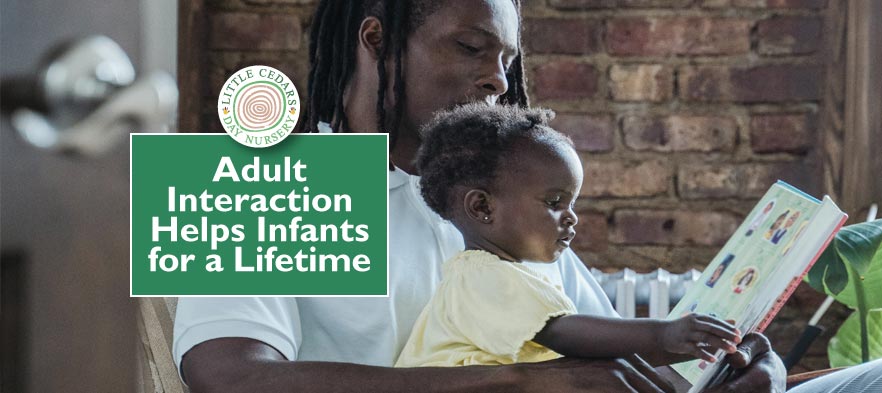
 The Government’s Early Years Foundation Stage (‘EYFS’) framework prescribes how adults should approach the education and development of children under five. As such, it forms the backbone of the curriculum at childcare settings like Little Cedars Nursery in Streatham. The EYFS guidelines were expanded this year (2021) and one aspect of early childhood development discussed therein merits closer exploration: the affect of adult interaction on an infant’s brain development. Here we take a look.
The Government’s Early Years Foundation Stage (‘EYFS’) framework prescribes how adults should approach the education and development of children under five. As such, it forms the backbone of the curriculum at childcare settings like Little Cedars Nursery in Streatham. The EYFS guidelines were expanded this year (2021) and one aspect of early childhood development discussed therein merits closer exploration: the affect of adult interaction on an infant’s brain development. Here we take a look.
“A baby’s brain forms more than a million new connections every second when you interact with them.”
That’s an incredible statistic and one that was recently revised upwards, from a lower figure, by Harvard University’s Center on the Developing Child.
The centre explains that a baby’s brain develops through early experiences, not just because of inherent genetics. They go on to describe how experiences govern the architecture of the developing brain and form the foundation for all future learning, behaviour, and health.  Their research suggests that constructive experiences will build on and enhance the structure of the brain, whereas “adverse experiences early in life can impair brain architecture, with negative effects lasting into adulthood.”
Their research suggests that constructive experiences will build on and enhance the structure of the brain, whereas “adverse experiences early in life can impair brain architecture, with negative effects lasting into adulthood.”
It’s rather akin to the building of a house, starting first with the foundations during the early years and building on those gradually, to complete the full structure. The initial foundations of the brain may encompass things like control of motor function, hand-eye coordination etc. Further sub-layers of more complex skills are brought in on top, through billions of new connections generated in the brain, as the child grows and experiences more things. Interactions with adults are key to that.
Although it happens throughout an individual’s life, the growth in these new neural connections is by far the most prolific during the early years. Optimising the structure and depth of those foundations through varied and useful experiences during the early years is therefore incredibly important. Doing so ensures that the foundations for the individual’s future are strong.
How Can Parents Help With Infant Brain Development?
Serve & Return
 The Harvard Center on the Developing Child suggests that parents1 can help babies and toddlers develop their brain architecture in the best way through regular and strategic interaction between adult and infant. They call the process ‘serve and return’. Think of it as a tennis metaphor— we’ll explain. First, the child may indicate an interest in an object or activity. That’s the serve of the tennis ball, if you like. The adult should look out for such indications of interest, recognise them as a kind of invitation from the child and then get involved with that object or activity with the child. Responding in this way is like the ‘return’ of the ball in the tennis metaphor. It’s a great approach because the child is indicating what they are interested in and therefore, when a parent responds through activity involving themselves with the source of interest, the child will naturally get more from the interaction. After all, it was they who first indicated an interest and an adult can now help them to get the most from it.
The Harvard Center on the Developing Child suggests that parents1 can help babies and toddlers develop their brain architecture in the best way through regular and strategic interaction between adult and infant. They call the process ‘serve and return’. Think of it as a tennis metaphor— we’ll explain. First, the child may indicate an interest in an object or activity. That’s the serve of the tennis ball, if you like. The adult should look out for such indications of interest, recognise them as a kind of invitation from the child and then get involved with that object or activity with the child. Responding in this way is like the ‘return’ of the ball in the tennis metaphor. It’s a great approach because the child is indicating what they are interested in and therefore, when a parent responds through activity involving themselves with the source of interest, the child will naturally get more from the interaction. After all, it was they who first indicated an interest and an adult can now help them to get the most from it.
What Kind of Things are ‘Serves’?
A ‘serve’ by the child could simply be them pointing to an object. Or it could take the form of discarding one toy or game and moving onto another. When they’re older, it could take the form of a question, of course.
The ‘Return’
In each case, the parent should join in and the two begin playing with and exploring the object or activity of interest to the child. With the adult involved, the child is able to get much greater insight about the activity or focus of attention. So, it’s about watching out for signals of interest from the child and interacting with them around that focus of interest. The research suggests that this is very effective compared to forcing other things onto the child that might, at that point in time, be of lesser interest.
It’s about watching out for signals of interest from the child and interacting with them around that focus of interest.
What Else?
 Repetition is also important. This helps to reinforce circuits in the brain. Reminding a child several times about something will naturally help them to understand and remember the point under scrutiny.
Repetition is also important. This helps to reinforce circuits in the brain. Reminding a child several times about something will naturally help them to understand and remember the point under scrutiny.
The ‘serve and return’ approach doesn’t only inform the child about objects and activities around them; such interactions with adults also teach and reinforce good social and language skills. They also nurture appropriate emotional responses in the child. Together these set strong foundations for the child’s growing cognitive abilities along with enhancing their general wellbeing, in readiness to build upon them at pre-school, school and ultimately the workplace.
The responses from parents need to be reliable and appropriate, of course; otherwise it could lead to sub-par learning and brain development and even possible behavioural issues. In the worst cases, where there is regular toxic interaction between parent and child, issues with learning, behaviour and physical/mental health can regrettably instil themselves in the child’s developing brain. Such outcomes can go on to adversely affect the whole life of the unfortunate individual.
Did You Know …
Conclusion
 The research, as well as a good dose of common sense, shows the incredible importance of parents interacting well with children from the moment they are born. Their interaction and guidance will help the developing child to understand themselves, the world around them, and their place within it. Millions of brain connections are built with every interaction, building healthy foundations upon which the baby will grow into a well-rounded individual with the requisite cognitive, physical, social and emotional skills to handle life. It all comes down to love, responsive and responsible care, with parents matching the infant’s signals and needs with positive, insightful responses. The reassurance and tools such interactions give the infant will allow them to confidently, safely and comfortably explore and learn about the world and, going forwards, their place within it.
The research, as well as a good dose of common sense, shows the incredible importance of parents interacting well with children from the moment they are born. Their interaction and guidance will help the developing child to understand themselves, the world around them, and their place within it. Millions of brain connections are built with every interaction, building healthy foundations upon which the baby will grow into a well-rounded individual with the requisite cognitive, physical, social and emotional skills to handle life. It all comes down to love, responsive and responsible care, with parents matching the infant’s signals and needs with positive, insightful responses. The reassurance and tools such interactions give the infant will allow them to confidently, safely and comfortably explore and learn about the world and, going forwards, their place within it.
Outstanding Childcare in Streatham, South West London
 If you are looking for a really good pre-school or nursery for your childcare in Streatham, please do consider Little Cedars Day Nursery. We offer high quality childcare in the London SW16 area, so are also convenient for those looking for the best nurseries, pre-schools and childcare services in Streatham Common, Streatham Hill, Streatham Park, Furzedown, Tooting, Tooting Bec, Balham, Norbury & Colliers Wood. Book a visit, register for a place, or get in touch for more information by choosing a button below:
If you are looking for a really good pre-school or nursery for your childcare in Streatham, please do consider Little Cedars Day Nursery. We offer high quality childcare in the London SW16 area, so are also convenient for those looking for the best nurseries, pre-schools and childcare services in Streatham Common, Streatham Hill, Streatham Park, Furzedown, Tooting, Tooting Bec, Balham, Norbury & Colliers Wood. Book a visit, register for a place, or get in touch for more information by choosing a button below:
1. We refer to parents throughout this piece for the sake of brevity, i.e. to avoid repetition. Parents is our placeholder to mean anything from parents to care-givers and guardians.

